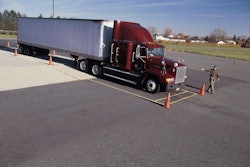The surge in e-commerce from 0.6% of retail sales in 1996 to 15.6% today, and increased consumer demand for rapid and reliable shipping, have been a driving force for job growth in the warehouse and transportation sector. The industry still faces a lot of pressure, however.
Some of those pressures include workforce issues, like shortages of drivers and warehouse workers, an aging trucking workforce, high employee turnover, and relatively high accident and injury rates.
Joining Jason and Matt this week on the 10-44 is ZipRecruiter Chief Economist Julia Pollak, who talks about the transportation and warehousing sector's growth, as well as its recent challenges.
Contents of this video
00:00 10-44 intro
00:33 Transportation and warehousing
01:23 Employment growth
02:26 E-commerce and automation
03:35 Demand for trucking
06:55 Transportation industry and remote jobs
07:25 Female transportation and warehouse workers
08:28 Transportation and warehouse job
Jason Cannon:
CCJ's 10-44 is brought to you by Chevron Delo heavy duty diesel engine oil. Now there's even more reasons to choose Delo. The transportation and warehouse sector has emerged as the fastest growing industry for jobs, in both the aftermath of the pandemic and throughout the past decade. You're watching CCJ's 10-44, a weekly episode that brings you the latest trucking industry news and updates from the editors of CCJ. Don't forget to subscribe and hit the bell for notifications so you'll never miss an installment of 10-44.
Hey, everybody, welcome back. I'm Jason Cannon and my co-host on the other side is Matt Cole. The surge in eCommerce from about 0.6% of retail sales in 1996 to about 15.6% today. And the increased in consumer demand for rapid and reliable shipping have been a driving force of job growth in the warehouse and transportation sector, but that industry still faces a lot of pressure.
Matt Cole:
Some of those pressures include workforce issues, like shortages of drivers, and warehouse workers and aging trucking workforce, high employee turnover, and relatively high accident and injury rates.
Jason Cannon:
The transportation and warehouse sector has added the most jobs since the pandemic and over the last decade compared to other sectors. And within that sector, the warehousing and storage category has added the most jobs, but the last several months have been tough, according to ZipRecruiter chief economist, Julia Pollak.
Julia Pollak:
Employment grew 16.5% in trucking, and warehousing and after the pandemic, and in the last few months it has contracted 1.4%, which is a relatively small contraction in comparison. But obviously, if one is comparing industry conditions to those that prevailed in 2021 and 2022, this is quite a different feeling. The impact on individual truck drivers and owner operators is much larger than that decline would show, because the effect of declining demand on the availability of work on hours of work, is compounded by the effect on wages and freight rates. And an additional effect, which is the growth in deadhead miles, and the increased difficulty getting all routes covered and solving the matching problem. So, the industry has become much more challenging in the last few months.
Matt Cole:
Taking a look at the broader picture, Julia says the ongoing shift in eCommerce compounded by the fact that transportation jobs are difficult to automate, means the outlook is good.
Julia Pollak:
The shift to e-commerce continues a pace. Many industries like hospitality are making huge changes that have implications for transportation. For example, many are closing their hotel restaurants or their room service offering. So customers are instead ordering food on Uber Eats and things like that.
So this sort of shift that happened in e-commerce towards warehouses plus transportation is also happening in the dining sector increasingly with cloud kitchens in distributed kitchens and warehouses and food being trucked. So the long-term prospects for the industry, I think are still good, largely because the automation problem turns out to be very tricky to solve and will take longer to solve. So jobs are not going to be replaced by automation as quickly as they're going to be added in the next couple of years due to those shifts.
Jason Cannon:
Truck transportation jobs have seen about a 14% growth in payroll employment in the last 10 years according to ZipRecruiter's 2024 labor market outlook report. As far as transportation modes go, that lags only behind air.
Julia Pollak:
I think other forms of transportation have just proven to be more risky, and so trucks continue to be the way to go. We are also seeing quite a lot of reshoring and friendshoring happening in manufacturing. And that is having an effect on demand for trucking. And instead of shipping manufactured goods across the ocean, we're now able to truck them from Mexico through the United States. So, that is a major trend behind this. We have seen this huge increase, over 60% increase in construction manufacturing spending, sorry, manufacturing construction spending, so spending on factory construction. Since the pandemic, that figure hit a new record high this week. And so, there are lots of industries that are doing pretty well, and that have relied on the trucking sector for a lot of their materials and their growth. So, I think the trends in manufacturing generally, and so the good sector bode well for transportation, as do the trends in hospitality, and in retail and dining, et cetera.
Matt Cole:
Some of the most highly sought after jobs in transportation are part of a technology enabled shift that we're seeing in just about every other industry. Julia tells us what that is after a word from 10-44 sponsor, Chevron Lubricants.
Speaker 4:
These past few years have been less than easy. We've encountered challenges we never imagined we'd ever have to deal with, from makeshift home offices and video meetings to global supply chain uncertainty, price instability, market disruptions and everything in between. Delivering the level of services and products our customers had come to expect was difficult for all of us. We can't change what's behind us, but we can definitely learn from it. We can adapt, evolve and take steps to reset our thinking. Adapt our strategies and restore your trust in us to better meet your needs now and in the future. That change begins today.
Today we break with convention and introduce a rebalance line of Delo heavy duty engine oils. We've reduced our product line from four categories to two. Consolidated and simplified, this lineup removes complexity from the manufacturing processes, enhancing price stability, and supply chain reliability so you can trust you'll have the premium products you need to keep your business always moving forward. Our break with convention optimizes the Delo lineup to allow you to provide your customers with the best synthetic blend and synthetic heavy duty engine oils in the market, fully available at prices you can rely on. It's your assurance that you'll be well positioned to be their trusted source for proven engine protection that keeps equipment on the job, giving your customers even more reasons to choose Delo.
Julia Pollak:
We certainly see interest in roles that can be done remotely. Freight dispatcher is one of those, where often people can either have a comfortable cushy office job or work from home. And those jobs are just hugely, hugely popular still. More than 60% of job seekers on ZipRecruiter at any one time say that they'd prefer to find a remote job. That has not declined, and even as the pandemic has receded.
Jason Cannon:
Despite being a major focus in employee recruitment, the female share of transportation warehouse workers appears to have peaked. Women rapidly rose from about 11% to 27% of the transportation warehouse workforce between 1972 and 2001, but they've not made a lot of inroad since. That's according to ZipRecruiter's report.
Julia Pollak:
We hear so many companies talking about the huge pushes they're making to recruit female truck drivers. And we've seen the testimonials. We've seen the women talking about their experiences, how the industry is becoming more female friendly and whatnot, and yet it seems like there's a ceiling that the industry can't really get past 28 or so percent women. And the change is highly, highly procyclical. So, when the industry becomes more attractive, more women come in. And when it cools down a bit, they leave again. So, we will see. If there's another long economic expansion, we could see that number get to new heights.
Matt Cole:
If you've been following any of CCJs economic coverage dating back to last year, you've probably noticed a theme when it comes to 2024 forecasts, more of the same. Julia says the transportation and warehouse job market is no different.
Julia Pollak:
I think we're looking at a continued, gradual, fairly orderly downtick until financial conditions that have improved in the economy overall and monetary policy becomes less restrictive. I think it really is the key to turning things around. I think current level of rates is holding back a lot of investment and reducing demand for transportation. Industries have been remarkably resilient despite how high interest rates have been. I mean, construction actually added jobs in 2023. The economy still has enough tailwinds. The US consumer is still strong enough that it's largely offsetting the effect of restrictive interest rates, and that companies are in a terrific position to invest and grow again, once financial conditions improve. I think many companies are planning to expand or expecting that the things will improve and that they'll be able to expand in the back half of the year. That's what we hear from a lot of employers.
Jason Cannon:
That's it for this week's 10-44. You can read more on ccjdigital.com. While you're there, sign up for our newsletter and stay up to date on the latest in trucking industry news and trends. If you have any questions or feedback, please let us know in the comments below. Don't forget to subscribe and hit the bell for notifications so you can catch us again next week.










